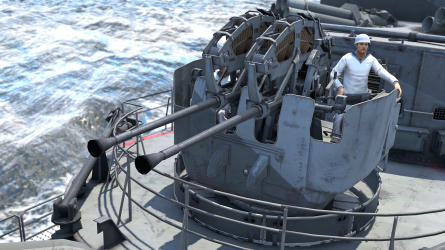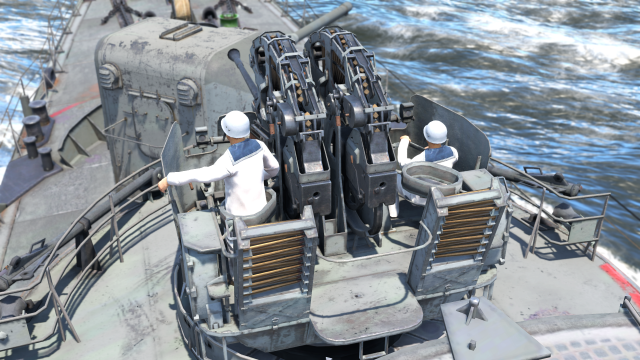Difference between revisions of "40 mm/70 MEL58 (40 mm)"
Colok76286 (talk | contribs) (Edits) |
Jareel_Skaj (talk | contribs) (+Ammunition) |
||
| Line 19: | Line 19: | ||
<!-- ''Describe the shells that are available for the weapon and their features and purpose. If it concerns autocannons or machine guns, write about different ammo belts and what is inside (which types of shells).'' --> | <!-- ''Describe the shells that are available for the weapon and their features and purpose. If it concerns autocannons or machine guns, write about different ammo belts and what is inside (which types of shells).'' --> | ||
The MEL58 can only carry two types of shells: an AP-T and a HEFI-T (Proximity Fuse). The default belt is a mix of the two. The HE belt contains three HEFI-T rounds and one AP-T, while the opposite is true of the AP belt, consisting of three AP-T rounds and one HEFI-T. | The MEL58 can only carry two types of shells: an AP-T and a HEFI-T (Proximity Fuse). The default belt is a mix of the two. The HE belt contains three HEFI-T rounds and one AP-T, while the opposite is true of the AP belt, consisting of three AP-T rounds and one HEFI-T. | ||
| + | {{:{{PAGENAME}}/Ammunition|40 mm M-DN51 HE-T, 40 mm HE-T-PF}} | ||
=== Comparison with analogues === | === Comparison with analogues === | ||
Latest revision as of 23:01, 5 November 2024
Contents
Description
Write an introduction to the article in 2-3 small paragraphs. Briefly tell us about the history of the development and combat using the weaponry and also about its features. Compile a list of air, ground, or naval vehicles that feature this weapon system in the game.
Vehicles equipped with this weapon
General info
The 40 mm/70 MEL58 is a fast-firing, clip-fed, high-velocity gun, capable of dealing with enemies within 2.6 km.
Available ammunition
The MEL58 can only carry two types of shells: an AP-T and a HEFI-T (Proximity Fuse). The default belt is a mix of the two. The HE belt contains three HEFI-T rounds and one AP-T, while the opposite is true of the AP belt, consisting of three AP-T rounds and one HEFI-T.
| Penetration statistics | |||||||
|---|---|---|---|---|---|---|---|
| Ammunition | Type of warhead |
Penetration @ 0° Angle of Attack (mm) | |||||
| 10 m | 100 m | 500 m | 1,000 m | 1,500 m | 2,000 m | ||
| M-DN51 HE-T | HEF-T | 4 | 4 | 4 | 4 | 4 | 4 |
| HE-T-PF | HE-VT | 5 | 5 | 5 | 5 | 5 | 5 |
| Shell details | ||||||||||||
|---|---|---|---|---|---|---|---|---|---|---|---|---|
| Ammunition | Type of warhead |
Velocity (m/s) |
Projectile mass (kg) |
Fuse delay (m) |
Fuse sensitivity (mm) |
Explosive mass (TNT equivalent) (g) |
Ricochet | |||||
| 0% | 50% | 100% | ||||||||||
| M-DN51 HE-T | HEF-T | 1,005 | 0.96 | 0 | 0.1 | 114.48 | 79° | 80° | 81° | |||
| Proximity-fused shell details | ||||||||||||
|---|---|---|---|---|---|---|---|---|---|---|---|---|
| Ammunition | Type of warhead |
Velocity (m/s) |
Projectile mass (kg) |
Fuse delay (m) |
Fuse sensitivity (mm) |
Arming distance (m) |
Trigger radius (m) |
Explosive mass (TNT equivalent) (g) |
Ricochet | |||
| 0% | 50% | 100% | ||||||||||
| HE-T-PF | HE-VT | 1,025 | 0.88 | 0 | 0.1 | 150 | 7 | 190.8 | 79° | 80° | 81° | |
Comparison with analogues
Give a comparative description of cannons/machine guns that have firepower equal to this weapon.
Usage in battles
The high rate of fire and good ammunition allows you to tackle small boats and larger ones it meets at its BR.
Pros and cons
Pros:
- Very fast firing 40 mm guns
- Access to proximity-fused high explosive shells
Cons:
- Overheats quickly
History
The 40 mm/70 MEL58 is a German variant of the Bofors L/70. An improvement over the older Bofors L/60 for the jet age, the Bofors L/70 fired a larger cartridge at a higher muzzle velocity and rate of fire along with all of the guns being air-cooled when certain L/60 variants were water-cooled. The MEL58 first entered West German service in 1958 as the name suggests. The Bundesmarine (Federal Navy, later known as the Deutsche Marine), had been formed just two years earlier due to international tensions from the Cold War and would use the MEL58 (a Bofors L/70 with a modernized SAK mount) first on their Fletcher-class destroyers received from the United States. The MEL58 would later be used on their E-boat followed up, the Jaguar-Klasse, the Köln-class frigates such as the Köln and Lübeck, and the Ensdorf, Kulmbach, and Frankenthal-class minesweepers. The Deutsche Marine and Luftwaffe (German Air Force) also used the L/70 with D21 radar in the anti-aircraft role though it has been mostly replaced by Roland Surface-to-Air Missiles after the late 1980s and the domestic Rheinmetall MLG-27 is beginning to phase out the L/70 on their minesweeper fleet. Despite gradually leaving German service, the venerable design of the Bofors L/70 means it still remains in service in production and service in multiple other nations.
Media
- Images
See also
External links
Paste links to sources and external resources, such as:
- topic on the official game forum;
- other literature.
| Germany naval cannons | |
|---|---|
| 15 mm | MG 151 |
| 20 mm | 2 cm/65 C/30 · 2 cm/65 C/38 · 2 cm/65 Flakzwilling 38 · 2 cm/65 Flakvierling 38 · MG 151/20 |
| 30 mm | MK103/38 |
| 37 mm | FlaK-Lafette C/36 · 3.7 cm FlaK-Lafette LM/42 · SK C/30 · FlaK.36 · FlaK43 |
| 40 mm | 40 mm/70 MEL58 · Bofors Flak 28 · Bofors L/70 model 1948 |
| 52 mm | 52 mm/55 SK L/55 |
| 88 mm | 8.8 cm/76 SK C/32 · S.K.C/35 · FlaK.18 · Flak.36 · 88 mm/45 AA SK L/45 · 88 mm/45 casemate SK L/45 |
| 100 mm | 100 mm/55 MLE model 53 |
| 105 mm | SK C/32 · SK C/33 AA |
| 120 mm | L45 |
| 128 mm | 12.8 cm/45 SK C/34 · 12.8 cm SK C/41 |
| 150 mm | 150 mm/45 SK L/45 · 15 cm/48 KC/36 · 15 cm/55 SK C/28 · 15 cm/60 SK C/25 |
| 203 mm | 20.3 cm/60 SK C/34 |
| 283 mm | 283 mm/45 SK L/45 · 283 mm/52 SK C/28 · 283 mm/54,5 SK C/34 |
| 305 mm | 305 mm/50 SK L/50 |
| 380 mm | 38 cm SK L/45 |
| Foreign: | |
| 23 mm | ZU-23 (USSR) |
| 25 mm | 2M-3 (USSR) |
| 30 mm | AK-230 (USSR) |
| 37 mm | V-11 (USSR) |
| 76 mm | 76 mm/62 OTO-Melara Compact (Italy) |
| 100 mm | 100 mm/56 B-34 (USSR) |





